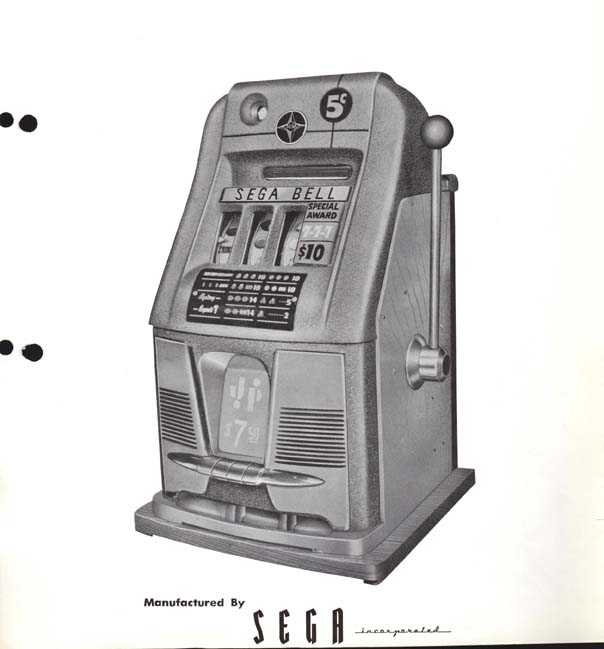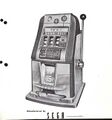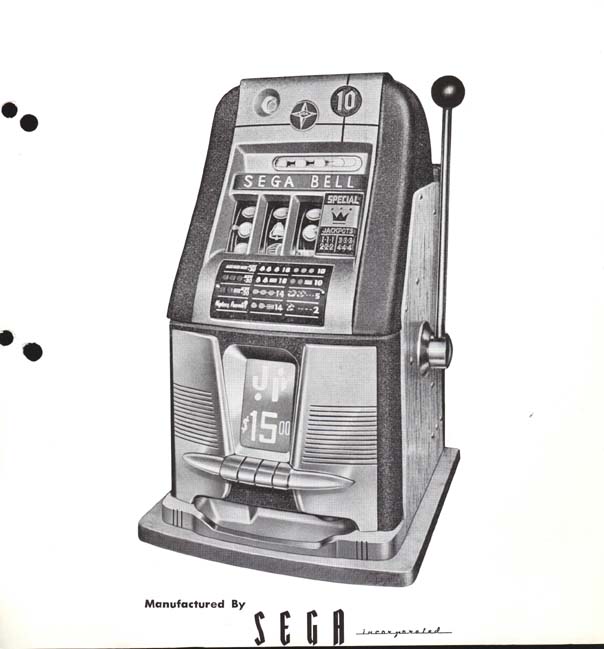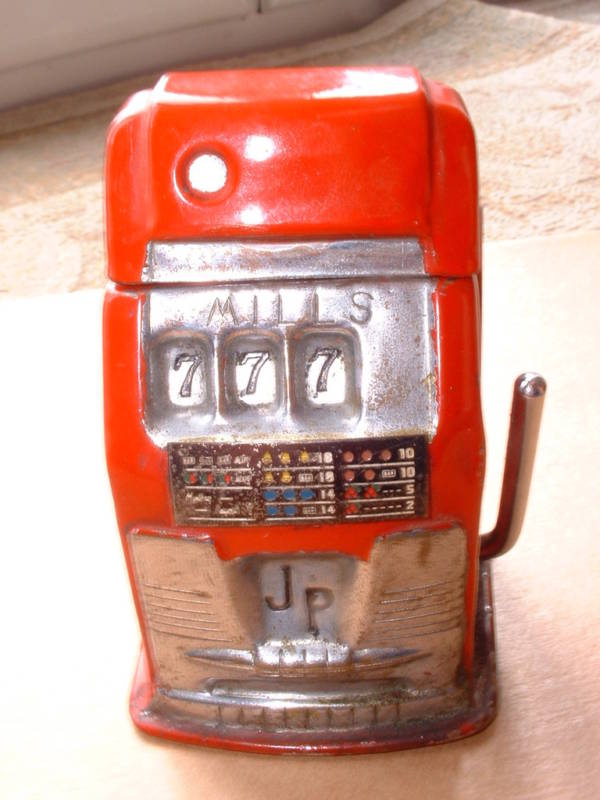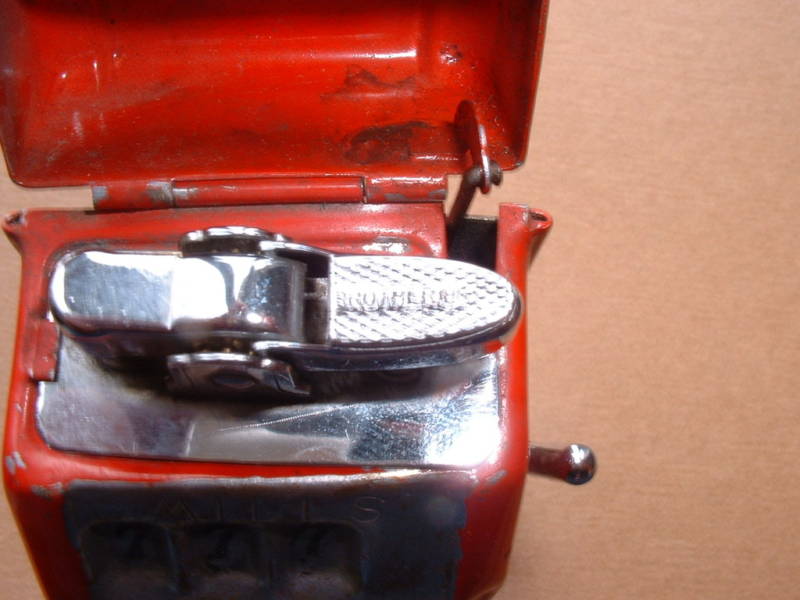Difference between revisions of "Sega Bell"
From Sega Retro
m (Text replacement - "==Promotional Material==" to "==Promotional material==") |
|||
| (27 intermediate revisions by 4 users not shown) | |||
| Line 1: | Line 1: | ||
{{Bob | {{Bob | ||
| − | | | + | | image=SegaBellD SlotMachine.jpg |
| − | | | + | | developer=[[Service Games, Japan]], [[Sega Inc.]] |
| − | | | + | | distributor=[[Club Specialty Overseas, Inc.]] |
| − | + | | system=Slot machine | |
| − | | releases={{ | + | | players=1 |
| − | | | + | | genre= |
| + | | releases={{releasesArcade | ||
| + | | slot_date_us=1956 | ||
| + | | slot_date_uk=1960 | ||
}} | }} | ||
}} | }} | ||
| − | The ''''' | + | {{sub-stub}}The '''''{{PAGENAME}}''''' is a brand of slot machines in the [[Bell series|''Bell'' series]] sold by [[Service Games, Japan]]. It is believed to have originated from either 1956 or 1957. |
| − | The ''Sega Bell'' is | + | The ''Sega Bell'' is thought to be an unlicensed clone of the ''High Top'' slot machine, manufactured by the Mills Novelty Company (later Mills Bell-O-Matic) from the late 1940s. It is thought that Service Games would take ''High Top'' machines in need of repair, would manufacture replacement parts in Japan then re-brand and re-sell as ''Sega Bells'' (or alternatively, manufacture full units using the ''High Top'' design). |
| − | It is thought that ''Sega Bell''s, like later slot machines and many of its rivals, were often bespoke units built to suit a customers' needs, so very few machines can be considered identical in terms of aesthetics. | + | It is thought that ''Sega Bell''s, like later slot machines and many of its rivals, were often bespoke units built to suit a customers' needs, so very few machines can be considered identical in terms of aesthetics. ''Sega Bell''s are often found set up for US dollar cents (usually 10¢) as many were sold to US military bases across the pacific. Around 1960 a distribution chain was also established to bring ''Sega Bell''s to the United Kingdom, usually taking 6d (sixpence in pre-decimal money; models may have been converted in the 1970s). The ''[[Copper Sega]]'' is a ''Sega Bell'' designed for one-pence pieces. |
| − | + | ==Legality== | |
| + | Service Games (incorrectly) claimed to have the rights to distribute Mills machines in the "Pacific Ocean area" (which at the time included Japan, Korea, Formosa (modern day Taiwan), the Philippines and the Japanese islands of Okinawa (which were occupied by the US after World War II and was classed as an entirely separate entity)). Equally they claimed to import parts from the Bell-O-Matic factory in Chicago (later Nevada) and would use the Mills logo to suggest they were authorised to do so{{fileref|MillsBell SlotMachine Manual.jpg}}{{fileref|ServiceGamesPartsCatalog Back.jpg}}{{fileref|PartsPriceList SlotMachine Manual ServiceGamesNevada 01.jpg}}, though more likely all parts were manufactured in Japan to cut costs. "Worldwide" ''Sega Bell'' distribution was handled by [[Club Specialty Overseas, Inc.]]. | ||
| − | + | The ''High Top'' design was popular, but at this point quite old, being superseded by new models which Mills was pushing. Being theoretically based outside of the legal juristiction of the United States, it could be suggested that Service Games, Japan chose to capitalise on a market that Mills had not yet explored by selling older, partially-used products at a discounted rate, perhaps assuming that Mills wouldn't notice nor care about the operation. | |
| − | + | ||
| − | + | Mills seemingly became aware of this practise in late 1957, declaring that only Mills Bell-O-Matic had the rights to manufacture its machines, in its plant in Reno, Nevada{{magref|cb|1957-12-28|95}}. It would later start including warnings in its advertising{{magref|cb|1958-02-15|55}}, and would later directly name and shame Service Games and West German firm, Westlee GmbH (later Standard Equipment & Service GmbH), Service Games distributor in that country{{fileref|Fraud and Corruption in Management of Military Club Systems 1969 (United States Government Printing Office).pdf|page=1839}}{{fileref|DiamondStar SlotMachine UK PrintAdvert.jpg}}, for producing copies. It also noted the unlicensed use of its "owl" trademark{{magref|cb|1958-06-21|63}}, informing readers that this alone was not enough to ensure the product was official. | |
| − | + | ||
| − | + | By mid-1959 Mills was still warning its customers of "imitation and rebuilt machines from Japan and elsewhere", though had established an official distribution network with the Leonard Haimes Company, which had offices in London, Paris, Frankfurt, Casablanca, Taiwan, Reykajvik and Madrid{{magref|cb|1959-07-25|156}}. A second official distributor, Tradeship Ltd. had offices in Ottawa, Seoul, Pusan, Inchon, Tokyo, Hong Kong and Saigon. It is not known what effect these official distributors had on Service Games, Japan's business. | |
| − | + | ||
| − | + | Later ''Sega Bells'' seemingly downplayed an official connection to Mills, and Service Games, Japan stopped using the owl trademark, but production of units continued. By 1960 Service Games had created its own unique designs of slot machine, collectively known as the [[Star series|''Star'' series]], and would no longer pretend to have any connection to Mills-related companies or products. | |
| − | + | ||
| + | ==Promotional material== | ||
| + | {{gallery | ||
| + | |{{gitem|Segabelltypea_01.jpg|Flyer 1}} | ||
| + | |{{gitem|Segabelltypeb_01.jpg|Flyer 2}} | ||
| + | |{{gitem|Segabelltypec_01.jpg|Flyer 3}} | ||
| + | |{{gitem|Segabelltyped_01.jpg|Flyer 4}} | ||
| + | }} | ||
| − | ==Lighter== | + | ===Lighter=== |
A promotional lighter was made for Service Games using a Mills Hightop as a case. | A promotional lighter was made for Service Games using a Mills Hightop as a case. | ||
| − | + | {{gallery | |
| − | + | |{{gitem|Servicegames mills lighter1.jpg}} | |
| − | + | |{{gitem|Servicegames mills lighter2.jpg}} | |
| − | + | |{{gitem|Servicegames mills lighter3.jpg}} | |
| − | + | }} | |
| − | == | + | ==Photo gallery== |
<gallery> | <gallery> | ||
| − | + | Mills Hightop.jpg|Original Mills ''High Top'' machine from the late 1940s | |
| − | + | Segabelltypea_machine02.jpg|Converted Mills ''High Top'' to ''Sega Bell'' | |
| − | + | SegaBell SlotMachine 1.jpg | |
| − | + | SegaBellD SlotMachine.jpg | |
| + | SegaBell SlotMachine 2.jpg | ||
| + | Segabelltypea 02.jpg|Type A (detail) | ||
| + | Segabelltypeb 02.jpg|Type B (detail) | ||
| + | Segabelltypec 02.jpg|Type C (detail) | ||
| + | Segabelltyped 02.jpg|Type D (detail) | ||
</gallery> | </gallery> | ||
| Line 48: | Line 64: | ||
| manual=MillsBell SlotMachine Manual.jpg | | manual=MillsBell SlotMachine Manual.jpg | ||
}} | }} | ||
| − | + | ||
| + | ==References== | ||
| + | <references/> | ||
| + | |||
| + | {{Gambling|classic}} | ||
Latest revision as of 02:41, 13 September 2024
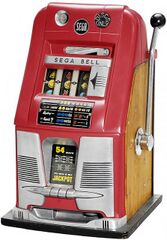
| |||||||||||||
| Sega Bell | |||||||||||||
|---|---|---|---|---|---|---|---|---|---|---|---|---|---|
| System(s): Slot machine | |||||||||||||
| Developer: Service Games, Japan, Sega Inc. | |||||||||||||
| Distributor: Club Specialty Overseas, Inc. | |||||||||||||
| Number of players: 1 | |||||||||||||
|
This teeny-tiny article needs some work. You can help us by expanding it.
The Sega Bell is a brand of slot machines in the Bell series sold by Service Games, Japan. It is believed to have originated from either 1956 or 1957.
The Sega Bell is thought to be an unlicensed clone of the High Top slot machine, manufactured by the Mills Novelty Company (later Mills Bell-O-Matic) from the late 1940s. It is thought that Service Games would take High Top machines in need of repair, would manufacture replacement parts in Japan then re-brand and re-sell as Sega Bells (or alternatively, manufacture full units using the High Top design).
It is thought that Sega Bells, like later slot machines and many of its rivals, were often bespoke units built to suit a customers' needs, so very few machines can be considered identical in terms of aesthetics. Sega Bells are often found set up for US dollar cents (usually 10¢) as many were sold to US military bases across the pacific. Around 1960 a distribution chain was also established to bring Sega Bells to the United Kingdom, usually taking 6d (sixpence in pre-decimal money; models may have been converted in the 1970s). The Copper Sega is a Sega Bell designed for one-pence pieces.
Contents
Legality
Service Games (incorrectly) claimed to have the rights to distribute Mills machines in the "Pacific Ocean area" (which at the time included Japan, Korea, Formosa (modern day Taiwan), the Philippines and the Japanese islands of Okinawa (which were occupied by the US after World War II and was classed as an entirely separate entity)). Equally they claimed to import parts from the Bell-O-Matic factory in Chicago (later Nevada) and would use the Mills logo to suggest they were authorised to do so[1][2][3], though more likely all parts were manufactured in Japan to cut costs. "Worldwide" Sega Bell distribution was handled by Club Specialty Overseas, Inc..
The High Top design was popular, but at this point quite old, being superseded by new models which Mills was pushing. Being theoretically based outside of the legal juristiction of the United States, it could be suggested that Service Games, Japan chose to capitalise on a market that Mills had not yet explored by selling older, partially-used products at a discounted rate, perhaps assuming that Mills wouldn't notice nor care about the operation.
Mills seemingly became aware of this practise in late 1957, declaring that only Mills Bell-O-Matic had the rights to manufacture its machines, in its plant in Reno, Nevada[4]. It would later start including warnings in its advertising[5], and would later directly name and shame Service Games and West German firm, Westlee GmbH (later Standard Equipment & Service GmbH), Service Games distributor in that country[6][7], for producing copies. It also noted the unlicensed use of its "owl" trademark[8], informing readers that this alone was not enough to ensure the product was official.
By mid-1959 Mills was still warning its customers of "imitation and rebuilt machines from Japan and elsewhere", though had established an official distribution network with the Leonard Haimes Company, which had offices in London, Paris, Frankfurt, Casablanca, Taiwan, Reykajvik and Madrid[9]. A second official distributor, Tradeship Ltd. had offices in Ottawa, Seoul, Pusan, Inchon, Tokyo, Hong Kong and Saigon. It is not known what effect these official distributors had on Service Games, Japan's business.
Later Sega Bells seemingly downplayed an official connection to Mills, and Service Games, Japan stopped using the owl trademark, but production of units continued. By 1960 Service Games had created its own unique designs of slot machine, collectively known as the Star series, and would no longer pretend to have any connection to Mills-related companies or products.
Promotional material
Lighter
A promotional lighter was made for Service Games using a Mills Hightop as a case.
Photo gallery
Physical scans
References
- ↑ File:MillsBell SlotMachine Manual.jpg
- ↑ File:ServiceGamesPartsCatalog Back.jpg
- ↑ File:PartsPriceList SlotMachine Manual ServiceGamesNevada 01.jpg
- ↑ Cash Box, "December 28, 1957" (US; 1957-12-28), page 95
- ↑ Cash Box, "February 15, 1958" (US; 1958-02-15), page 55
- ↑ Fraud and Corruption in Management of Military Club Systems/Illegal Currency Manipulations Affecting South Vietnam: US Senate Hearings (1969-09-30 — 1969-10-07), page 1839
- ↑ File:DiamondStar SlotMachine UK PrintAdvert.jpg
- ↑ Cash Box, "June 21, 1958" (US; 1958-06-21), page 63
- ↑ Cash Box, "July 25, 1959" (US; 1959-07-25), page 156

